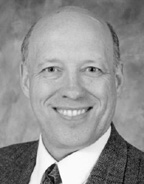On July 1, David Bylund, Ph.D, will begin a three-year leadership commitment to the American Society for Pharmacology and Experimental Therapeutics (ASPET), serving initially as president-elect. In 2003, he will begin a one-year term as president, and in 2004 a term as past president. 
Dr. Bylund joined UNMC in 1988 as professor and chairman of the department of pharmacology. His election to president-elect crowns a career in science that began more than 40 years ago.
“ASPET is the premier U.S. society for pharmacologists, a longtime member of the Federation of American Societies of Experimental Biology (FASEB) and one of the world’s leading societies for pharmacologists,” said William Berndt, Ph.D., recently retired vice chancellor for academic affairs and a member of ASPET for more than 30 years.
The society was founded in 1908 and, since 1923, 14 members have won the Nobel Prize. As president-elect, Dr. Bylund will attend ASPET governing council meetings twice a year, serve on the long range planning committee and as one of its delegates to the International Union of Pharmacology.
“I think the leader of ASPET is viewed by most pharmacologists as a highly respected scientist and leader — someone who has worked hard in the past to serve the discipline of pharmacology and who will continue to to so in the future,” Dr. Berndt said. “ASPET is endowed with imaginative and enterprising members and significant financial resources. Dr. Bylund’s election is a real honor, both for Dr. Bylund and UNMC.”
Pharmacology is the study of what drugs do to the body and what the body does to drugs. A drug is defined as any compound taken into the body. Today, researchers are in the midst of a shift in the types of drugs used — from relatively small organic compounds to a variety of complex substances. Pharmacologists believe that understanding the action of all types of drugs in the intact animal needs to be given equal weight with the understanding at the cellular and subcellular levels.
Dr. Bylund’s career in pharmacology had many influences, one of whom was America’s LSD guru, Timothy Leary. While attending State College High School in Pennsylvania, Dr. Bylund read about Leary’s LSD experiments and how LSD caused symptoms similar in some ways to schizophrenia. It occurred to Dr. Bylund that if drugs could cause mental illness, then drugs should be able to cure mental illness. That thought resulted in Dr. Bylund “inventing “a field he called “chemical psychiatry” (only to find out later that it already existed) — an area he continues to work in today at UNMC with research focusing on adolescent depression.
When he graduated from high school in 1964, Dr. Bylund received the Bausch & Lomb Honorary Science Award as one of Pennsylvania’s top science students and a scholarship to the California Institute of Technology. He left Caltech after two years and in 1970 received a bachelor’s degree in chemistry from Brigham Young University.
From 1971-1974, Dr. Bylund did his doctoral studies in biochemistry at the University of California at Davis with Edward Krebs, M.D., an ASPET member who would win the Nobel Prize in 1992. In 1975, Dr. Bylund accepted a postdoctoral fellowship with Sol Snyder, M.D., at Johns Hopkins University, one of the foremost psychopharmacologists in the United States.
The lack of emphasis, over the past two decades, on the support of research and training at the organ and whole systems levels is just one of several challenges Dr. Bylund will face as president of ASPET. In addition, Dr. Bylund says there is a concern for the loss of pharmacology as a discipline. At some medical schools, for example, there are attempts to merge departments, and pharmacology often loses out. ASPET’s mission of research and teaching includes supporting pharmacology education in schools of medicine, pharmacy, dentistry, nursing, veterinary medicine and the allied health professions.
“UNMC has given me the freedom to pursue service in ASPET since I came here in 1988,” Dr. Bylund said. “I’ve been the national secretary/treasurer for the past three years and I also served for five years as the editor of Pharmacological Reviews and many years on the editorial board of other ASPET publications. I consider my election to president as a tribute to UNMC for the university’s long-term support of ASPET’s mission and my participation.”